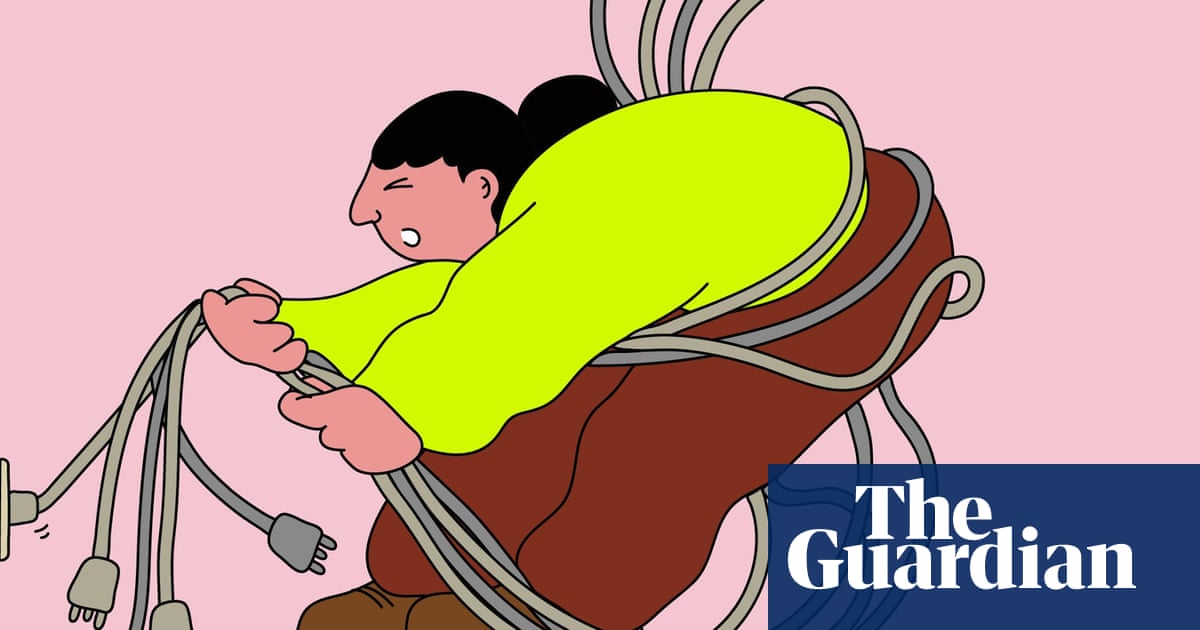My girlfriend, Amber, goes around the house before bedtime turning off my chargers for various appliances – my phone, my gaming laptop and my iPad – because she believes it to be a fire risk. We have lived together for almost five years now and this has been a problem for a while.
When I plug my phone in overnight, I often find it uncharged in the morning. It’s very annoying. Or sometimes when I get home from work and fancy playing a game on my laptop, I’ll settle down on the sofa with my snacks ready, and there will be no charge on my laptop. I then have to get off the sofa and recharge it. Now I make Amber get up to plug my laptop in if she’s unplugged it.
She says it’s a minor inconvenience, but waking up to go to work with an uncharged phone ruins your day. She’s also done it with my electric toothbrush – I’ve gone to brush my teeth before work and found it dead.
I never know what is going to be unplugged. Sometimes she switches off sockets at the wall; other times she physically unplugs my chargers.
Amber says it’s for safety, but then why does she unplug things in such an inconsistent way? There’s either a fire hazard with all of them or none – I don’t understand her reasoning.
Amber’s dad was a firefighter and he drilled this stuff into her. I get that there are safety guidelines but there aren’t fires breaking out all over the place because people leave their phones charging overnight. When I asked Amber’s dad about it, he was very chilled. He said: “It’s better if you don’t leave things plugged in,” and shrugged.
I have house insurance. I’d rather risk burning the house down. Amber thinks I don’t care about our cats getting toasted, but of course I do. I just don’t think there’s much chance of that happening. As a compromise, she now doesn’t turn off switches at the wall. But she still unplugs chargers if she leaves the house and no one is in, so I still find some of my devices uncharged and get irritated.
I always unplug my chargers before I leave the house – then plug them back in when I get back and actually need to use them. I turn off all Dillon’s stuff too, which annoys him.
It’s not about wasting electricity, as the amount a phone charger costs to run is very small; it’s about safety. I’ve always had a habit of turning things off as my dad was a firefighter and used to tell me stories of things catching fire. I probably take fire safety more seriously than Dad does now.
Dillon likes to leave his laptop charging overnight, which I think increases the risk of fire. When he comes home and it’s not fully charged, he only has to lean forward maybe half a metre to plug it back in, but he complains. He moans and says to me, “Can you plug it back in?”
We’ve been together for six years but this problem has been more pertinent over the last year or so since we got three cats. I’ve always been worried about things catching fire, but I particularly don’t want our cats to be burned alive while we’re out.
I’d rather unplug things and be just a little bit inconvenienced than set the house on the fire. Phones aren’t fridges, they are not designed to stay on overnight. If I wake up and touch our phone batteries, they’re really hot.
I think Dillon is overreacting. For example, when I unplugged Dillon’s toothbrush, he just used a manual one instead – it wasn’t a big deal.
Now as a compromise, if Dillon has left something charging, I will unplug it, but I don’t turn sockets off at the wall any more as that seemed to annoy him more. He would assume the switch at the wall was on and when he realised it wasn’t and something wasn’t charged, he would get upset.
From a fire safety perspective, I’d rather err on the side of caution. It’s similar with security: if you don’t double lock your door, it doesn’t mean you will get broken into, but you increase the risk a little by not doing it.
Should Amber stop unplugging things?
I get the fear of fires from electronics as I live in an old house, but that is no reason to unplug everything every night. A compromise would be to only buy electronics from certified venders that provide trustworthy devices.Ludovico, 23
It seems as though Amber just wants some peace of mind. If she grew up hearing about house fires, they’ve probably stuck with her. It would be much easier for Dillon to charge his devices during the day than for Amber to change her mindset.Amelia, 18
As long as you’re using devices that meet high safety requirements, the risk is small. Maybe compromise by unplugging things when you’re both away for a while, but doing so every night is unreasonable.Alan, 52
I honestly had never even considered this as an issue before reading this case. But now I’m convinced that Amber is right and this is a fire hazard. I’ll be unplugging all my devices tonight!Anna, 45
Amber isn’t guilty as technically she’s right about the fire risk. But she shouldn’t unplug things Dillon thinks are charging without telling him, while he should be more understanding of her concerns (although Amber might want to reflect on whether her habit of unplugging things points to an underlying anxiety).Taylor, 33
In our online poll, tell us who you think is in the wrong?
The poll closes on Wednesday 4 June at 10am BST
We asked whetherKady should get a tattooon her travels, like she promised her friend she would.2%of you said yes –Kady is guilty
98%of you said no –Kady is not guilty
